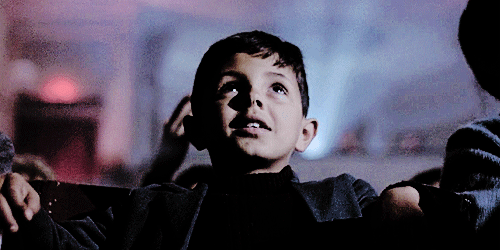The first movie for Psychology of Film is the winner for Best Foreign Language Film in 1989 Academy Award, Cinema Paradiso. Watching through 155 minutes of the movie makes me lost onto the screen, in the world of the main character, Salvatore "Toto" Di Vita. Set in small village on an island called Sicily, the movie brings back the flashback of Toto recounting back his memories back in the post world war II era. Throughout the movie, I knew this movie is an instant classic, golden in the way that people will remember not only how the story goes, but how they feel while watching the movie. Simple scenes that describing the life of the people in this village especially when they were watching the film in the cinema make this movie even more memorable, like we ourselves in the lecture theater were there with the crowd in the movie.
 |
| 6 years old Toto in the cinema |
Although the movie centers on the character Toto from he was a child until he was on his adulthood, this movie would not be loved as much as it is now without the supporting character, Alfredo. Toto became obsessed about learning how to operate the cinema projector merely by watching Alfredo doing them, a prove to Bandura's Social Learning theory? Maybe. But what driven Toto to become attached to the small local cinema was what Alfredo meant to him in his life. Toto's father left for the army, leaving Toto without a father figure in early on his life. Toto kept coming to Alfredo, finding comfort in his presence, keeping Alfredo company in his lonely job. Alfredo did warn Toto about the sacrifices ones have to make for the job. Imagine being the only person showing the people the movies, while sitting at the back alone not joining them. As the person to project the film, the whole community was counting on Alfredo, as their source of entertainment and escape in the boring small village.
 |
| Unlikely friendship between Alfredo and Toto |
The story from Toto's flashbacks filled up the holes, answering to the questions why Toto is the man he is, the successful, cold, and unmarried director. The experiences Toto went through since he was a child until teenager affected him so much,. He became a successful director thanks to Alfredo who exposed him to film at such early age and encourage him to get out of the island and never look back to the "nostalgia". Toto took Alfredo's words and kept on finding his way to become a successful director. Other than that, Toto also stayed unmarried, as his mother said "When I call you, a different woman always answers." showing he was unable to have a long lasting relationship with one woman over the years after leaving Sicily. This maybe got to do with Toto's first love or maybe the only love of his life, Elena. Toto lost contact with her making him more determined not to come back to Sicily. After all, when he got back after 30 years, he found that everything came back to him, he was still unable to let go of his old ghost.
This movie gave a larger impact on me when the closing scene, Toto watching the roles of film Alfredo gave him as present which are scenes that being cut off from the film roles, mostly kissing scenes. Toto watching them in tears, remembering Alfredo kept his word. When he was a kid he insisted Alfredo to give him the film roles as a deal, which was such a simple and quick scene. I was brought back to that scene, and it became one of the important scene in the movie without realizing it earlier. It ended nicely with "back in circle" kind of ending. That is how beautiful the movie is, every characters are important, every night on the cinema is important and most importantly how Toto found his answer in life by only looking back to the pasts that he tried to forget.
 |
| The End |

No comments:
Post a Comment